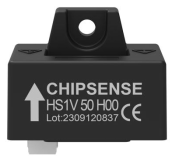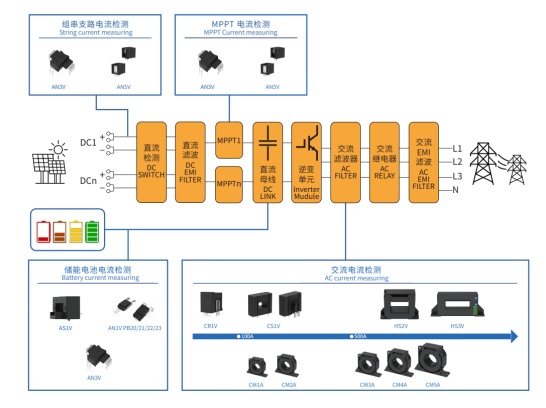
(1) Ensure the performance and stability of the photovoltaic system. Photovoltaic current detection is an important means to evaluate the performance and stability of photovoltaic systems. By detecting the DC current of photovoltaic modules or photovoltaic arrays, you can understand the power generation capacity and operating status of the system. If the current is abnormal, such as over current or short circuit, it may damage the photovoltaic modules and inverters, and even affect the stability and safety of the entire photovoltaic system. Therefore, photovoltaic current detection can find and deal with these problems in time to ensure that the photovoltaic system can run stably for a long time.
(2) Prevention of fire and safety hazards. Photovoltaic system equipment in the outdoor environment for a long time, will be eroded by natural factors such as light, rain, wind and sand, these factors will accelerate the aging of cables and connectors and other equipment, resulting in decreased insulation performance of the equipment, and serious fire. Through photovoltaic current detection, potential current anomalies and safety hazards, such as internal hidden cracks, heat spots and other problems, can be found in time, so as to take preventive measures to reduce the risk of fire and loss.
(3) Optimize system design and operation. Photovoltaic current detection can also provide data support for optimizing system design and operation. By monitoring the current output of photovoltaic modules, its performance and the overall power generation capacity of the system can be evaluated, providing a basis for optimizing the system design. At the same time, according to the changing trend of current data, the working parameters of the system can be adjusted to maximize the use of solar energy resources, improve power generation efficiency and reduce energy production costs.
(4) To meet the needs of intelligent operation and maintenance. With the intelligent development of photovoltaic power stations, the demand for remote monitoring and data analysis of equipment is increasing. Photovoltaic current detection is an important part of remote monitoring, through real-time monitoring of current data, equipment faults can be found in time, improve the accuracy of remote monitoring in the background, and meet the needs of intelligent operation and maintenance.
(5) Comply with regulations and standards. Many countries and regions have formulated regulations and standards on the safety of photovoltaic power generation systems, requiring that photovoltaic systems must be regularly tested to ensure that they meet the corresponding regulations and standards. By conducting photovoltaic current detection, it can ensure that the photovoltaic system complies with industry norms and legal requirements, and protects the rights and interests of investors and system operators.

(1) High precision and stability. Open-loop current sensors have high accuracy and stability, which is essential for photovoltaic current detection. Since the photovoltaic system needs accurate current measurement to ensure the performance and stability of the system, the open-loop current sensor can provide accurate and reliable current measurement data to meet the needs of the photovoltaic system.
(2) Fast response speed. The open-loop current sensor has a fast response speed and can quickly capture the current change. This is very important for photovoltaic systems, because photovoltaic systems need to respond quickly to current changes to ensure system stability and safety. The fast response characteristics of the open-loop current sensor make it an ideal choice for photovoltaic current detection.
(3)small size, light weight. Open-loop current sensors typically have a small size and weight, which makes them easy to install and integrate into photovoltaic systems. Photovoltaic systems typically require compact and efficient designs, so the small size and light weight of open-loop current sensors make them preferable.
(4) Cost effectiveness. Open-loop current sensors generally have a lower cost than closed-loop current sensors. This makes them more cost-effective in photovoltaic current detection, especially in large-scale photovoltaic systems, which can significantly reduce system costs.
(5) Strong applicability. Open loop current sensors are suitable for a variety of current measurement scenarios, including DC and AC current measurement. This allows them to meet the different current measurement requirements in photovoltaic systems, improving the flexibility and adaptability of the system.
(6) Non-contact measurement. The open-loop current sensor usually adopts the non-contact measurement method, which avoids the problems of poor contact and contact resistance caused by the traditional contact measurement method. This ensures the reliability of the sensor while also reducing maintenance costs.
CHIPSENSE HS1V series open loop Hall current sensor can enable photovoltaic current detection, mainly reflected in the following aspects:
(1) High precision measurement based on Hall principle. The CHIPSENSE HS1V series of open-loop current sensors operate on the Hall principle, which enables the sensor to measure DC, AC and pulse currents with high accuracy. In photovoltaic systems, the accuracy of current measurement is critical to evaluating system performance and stability. The high precision of HS1V series sensors ensures the accuracy of photovoltaic current detection.
(2) The original side insulation and safety. Photovoltaic systems usually involve high voltages and currents, so safety is a primary consideration. The primary and secondary sides of the CHIPSENSE HS1V series current sensors are insulated, which ensures the safe use of the sensors in high pressure environments. At the same time, the sensor meets the UL 94-V0 standard and has excellent flame retardant performance, further improving the safety of the system.
(3) Wide measuring range and adaptability. The CHIPSENSE HS1V series sensors are available in a variety of models to accommodate different measurement ranges. From HS1V 50 H00 to HS1V 600 H00, the rated current measurement range from 50A to 600A is covered, which makes the sensor suitable for photovoltaic systems of different sizes. In addition, the sensor also has a wide supply voltage range and temperature range, ensuring stable operation under different environmental conditions.
(4) Fast response and dynamic performance. In photovoltaic systems, current changes can be very rapid, so the sensor's response speed is critical to capturing current changes. CHIPSENSE HS1V series current sensors have a fast response time and can quickly capture current changes to ensure real-time and accurate photovoltaic current detection. At the same time, the dynamic performance of the sensor is excellent, and it can cope with various current fluctuations that may occur in the photovoltaic system
(5)Easy to install and maintain. The compact construction and standardized interface of the CHIPSENSE HS1V series sensors make installation and maintenance easy. The sensor uses a Molex 5045-04A socket for easy connection to the circuit board. At the same time, the sensor also provides detailed installation guidelines and precautions to ensure that the installation process goes smoothly.
CHIPSENSE photovoltaic current detection application cases CHIPSENSE is a national high-tech enterprise that focuses on the research and development, production, and application of high-end current and voltage sensors, as well as forward research on sensor chips and cutting-edge sensor technologies. CHIPSENSE is committed to providing customers with independently developed sensors, as well as diversified customized products and solutions.

“CHIPSENSE, sensing a better world!
www.chipsense.net
4F, Building C, ZHENGLING.Hi-TECH PARK(Core Space) , No. 2 Cuizhu 2nd Street, Xiangzhou District, Zhuhai, Guangdong Province, China
+86-756-8600806